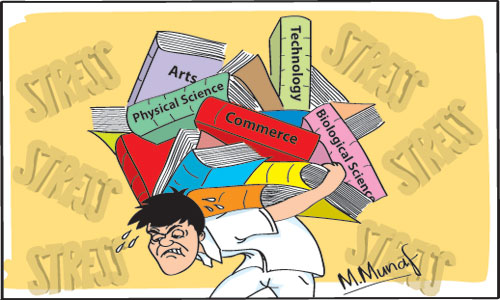Doc’s lesson to students: “Make stress work for you”
View(s):Continued from last month
“One of the difficulties about stress is that it can work for you or against you, just like a car tire. When the pressure in the tire is right, you can drive smoothly along the road: If it is too low, you feel all the bumps and the controls feel sluggish. If it is too high, you bounce over the potholes, and easily swing out of control.’
 As the count-down for the 2017 Advanced Level examination scheduled for August begins, this is the quote from Butler and Hope that Consultant Psychiatrist Dr. Gihan Abeywardena of the Kurunegala Teaching Hospital uses to guide stressed out students.
As the count-down for the 2017 Advanced Level examination scheduled for August begins, this is the quote from Butler and Hope that Consultant Psychiatrist Dr. Gihan Abeywardena of the Kurunegala Teaching Hospital uses to guide stressed out students.
Everyone has an ideal level of stress, but it differs from person to person, he says, pointing out that if there’s not enough stress then performance may suffer, due to the lack of motivation or boredom. However, too much stress results in a drop in performance due to stress-related problems like the inability to concentrate or illness.
Reiterating that students should learn to monitor their stress levels, firstly to identify each person’s own optimum level of stress and secondly to learn when to intervene to increase or decrease the level of stress, he urges them to “make stress work for you”.
To reduce school stress, Dr. Abeywardena suggests that as most people can really concentrate only for about 45 minutes, there should be a break of a few minutes thereafter. “Exercise, stretch, go outdoors to help the mind to absorb the material just learned and also get re-energized to continue studying.”
Focusing on sleep, he is quick to point out that regular sleeping habits help reduce stress and maintain good health. Continuous sleep for 6 hours is necessary! Students who get at least 8 hours of sleep prior to a test generally do better than those who stayed up all night studying. Explaining the importance of continuous sleep of at least 6 hours and not fragmented into two hours here and two hours there, he says that it helps the lessons in the short-term memory to be processed and consolidated in the long-term memory.
With stress being contagious, he advises students to avoid stressful people and particularly at exam time, resist the urge to have a study session with a super-tense friend.
When exam time comes around, stress could be managed in that period by structuring each day to include a minimum of 20 minutes of aerobic exercise, he says, advising the consumption of well-balanced meals, more whole grains, vegetables, nuts and fruits. Avoid caffeine as it could aggravate anxiety, insomnia, nervousness and trembling; reduce refined sugars because excess sugars cause frequent fluctuation in blood glucose levels, adding stress to the body’s physiological functioning; and do not take alcohol and drugs for these substances may add to headaches and depression; and a decrease in coping mechanisms.
Next, Dr. Abeywardena gets down to lessons and gives the following ‘revision’ tips:
Develop a time-table to monitor progress, however, making sure that adequate time has been allocated for fun and relaxation.
Plan the revision and complete it in time.
When revising, change from subject to subject without sticking to one subject for a long time so that there is no boredom or disheartenment. Set realistic targets of what can be achieved in the time available.
To prevent mental fatigue, take a short break when there is loss of concentration.According to him note/cue cards, writing key words, drawing posters and visual material, using patterns, colours, symbols and drawings, developing diagrams, pinning material where it can be seen all the time, making a mini-revision booklet and also listing definitions and rules help ease the way.
He advises students to practise writing answers to a question paper under examination conditions such as a three-hour time period, without a break, beginning at the same time as that of the actual examination. It may also be good to familiarize oneself by visiting the exam centre.
Referring to the power of positive thinking, this Psychiatrist stresses the need to spend time with other students who are positive.
In wide-ranging guidelines, Dr. Abeywardena dwells on where and when to study and also the need to avoid distractions. The place of study should be airy, comfortable, properly-lit, free of clutter and away from distractions as noise disrupts concentration. Ideally, there should be a study table, where the student can both read and write and keep all referral materials. “Avoid studying on the bed or sofa and avoid lying down and studying.”
Depending on each student, whether a morning person or a late night learner, study time should be decided by the student, he says, adding that the student should not get distracted by Facebook, Viber or other social media. Keep all unimportant issues at bay, as the AL exam should be the only focus.
Taking up the delicate issue of teenage love, Dr. Abeywardena is quick to point out that romantic decisions during adolescence can at times be detrimental and distract the student from his/her studies. “Postpone them, as there would be ample opportunities after entering university.”
| Tips on how to face exam day For the examination period, Dr. Abeywardena equips the student with certain strategies:
“After the exam, don’t hold post-mortems about who has written what, but go home early, if possible in your own transport. Don’t re-do the paper to find out how many marks you have secured,” says Dr. Abeywardena, adding that preparing for the next day’s paper is the important thing. He underlines that the most important thing is to “believe in yourself”. | |


